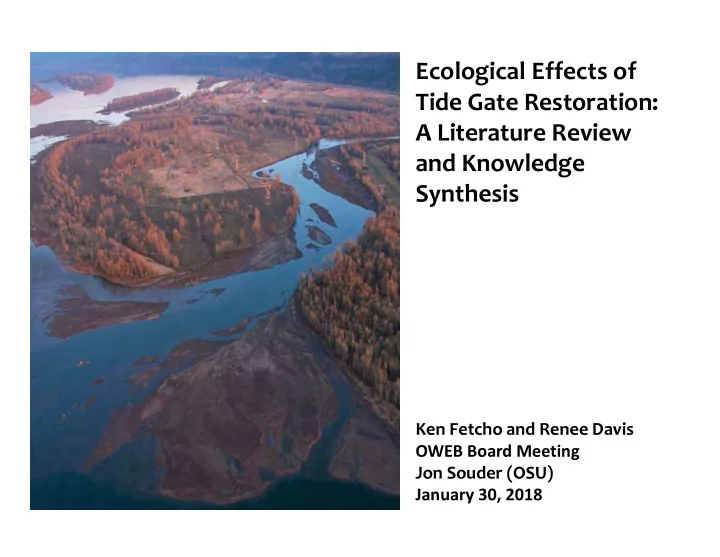

Ecological Effects of Tide Gate Restoration: A Literature Review (IMW) and Knowledge Synthesis Ken Fetcho and Renee Davis OWEB Board Meeting Jon Souder (OSU) January 30, 2018
Presentation Overview Significance of the tide gate topic Purpose of literature review Presentation outline Tide gate report overview o Report summary o - Introduction to the issue - Key findings - Recommendations - Lessons learned Next Steps o
Report Organization ∗ Executive Summary ∗ Ch. 1 - Introduction – Tide gate basics ∗ Ch. 2 - Methods ∗ Ch. 3 - Summary of ecological effects of tide gates and importance of estuary habitat ∗ Ch. 4 - Overview of work to determine tide gate restoration effects to salmonids and environmental factors ∗ Ch. 5 - Regional tide gate restoration and monitoring project summaries
Report Organization ∗ Ch. 6 - Thinking systematically about tide gates ∗ Ch. 7 – Summary of findings and recommendations ∗ Appendices ∗ Literature Cited
Ecological Effects of Tide Gate Upgrade or Removal: A Literature Review and Knowledge Synthesis Literature Review Institute for Natural Resources Oregon State University
Overview 1. How Tide Gates Work 2. Context For Restoration 3. Ecological Effects of Tide Gates 4. Restoration Approaches 5. Findings & Recommendations
How Tide Gates Work
Daily & Monthly Tidal Cycles Spring Tides Neap Tides
Trade-Offs 1. Opening Size & Angle 2. Water Velocity 3. Period Open
Mitigator Side-hinged Muted Tidal Regulator (MTR) Photos courtesy of Nehalem Marine
Context: Tide Gate Geography 1. Stream/River Mouth 2. Tributary Mouth 3. Field Drain/Ditch
Context: Project Goals 1. Infrastructure Protection 2. Fish Passage Improvement 3. Estuarine Rearing Habitat 4. Flood Control
1. Tide Gate Removal or Upgrade 2. Dike Removal and/or Setback 3. Channel Re- meandering 4. Vegetation & Wood Placement
Effects: Water Quality • Summer Water Temperature Higher • Dissolved Oxygen (DO) Lower • Abrupt Change in Salinity • Inhibited Sediment Transport
Native : Exotic Proportions Reference Sites: Mostly Natives / Few • Exotics Behind Gates: Non-game Native & Exotics • Fish Abundance Behind Gates: Natives Still Predominant • Potential Climate Change Effects •
Conventional Current Single Life History Multiple Life His tories Freshwater Survival OWEB #212-2044 Larson Creek (CoosWA) 25% Palouse Creek (CoosWA) 20% WF Smith River (ODFW) Winchester Creek (ODFW) 15% 10% 5% 0% 2002 2003 2004 2005 2006 2007 2008 2009 2010 2011 2012 2013 2014 2015 Spawning Year
Response: Remove Tide Gate Best Tide Gate = No Tide Gate → Multi-faceted Estuarine Restoration
Response: Upgrade Tide Gates Upgrades = Incremental Improvement • Best Conditions: ≈ 50% Open • Better Passage + Better Water Quality Restoration Benefits • Just Gate Upgrade ≠ Restoration • Habitat Determines Benefits
Finding: Incremental Continuum Upgrade with Muted Tidal Mechanism $ Replace & Resize Complete Structure $ Multi-faceted Restoration
Finding: Program Benefits • Designated Restoration Areas • Permitting Facilitated For Upgrades • Leverages Funding Sources • Improves Communication
Finding: Incorporate Mitigation 1. Largest Restoration Programs Driven By Mitigation Needs 2. Mitigation Expands Funding 3. Leverages Restoration Funds 4. Requires Effectiveness Monitoring
Finding: Program Monitoring 1. Need Consistent Protocols 2. Longer Time Frames (10+ Years) 3. Estuarine Restoration Benefits Known 4. Need Tide Gate Upgrade Information
Authors • Jon Souder, OSU Forest Engineering, Resources & Management • Guillermo Giannico, OSU Fisheries & Wildlife • Londi Tomaro, Institute for Natural Resources • Jeff Behan, Institute for Natural Resources
Next Steps Dissemination of Findings Explore connections to tide gate ‘Big Table’ effort Evaluate future monitoring needs McDonald Slough – pre- and post-project
Questions?
Recommend
More recommend